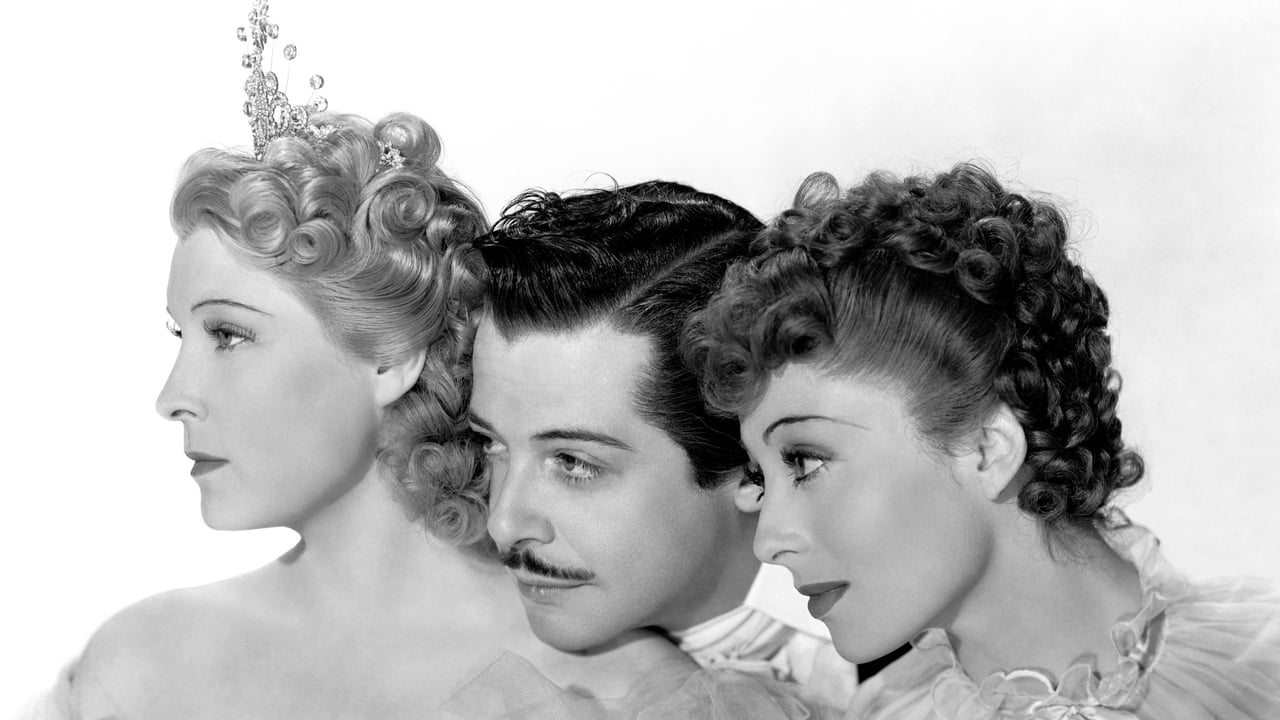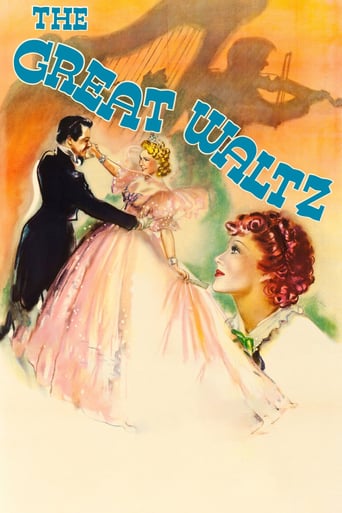Softwing
Most undeservingly overhyped movie of all time??
Lollivan
It's the kind of movie you'll want to see a second time with someone who hasn't seen it yet, to remember what it was like to watch it for the first time.
Tayloriona
Although I seem to have had higher expectations than I thought, the movie is super entertaining.
Bessie Smyth
Great story, amazing characters, superb action, enthralling cinematography. Yes, this is something I am glad I spent money on.
jakob13
The New York Times has spoken long of Julien Duvivier. Does he deserve a retrospective? Yes, he indeed does. A good place for the English speaking world to begin is the 1938 'Great Waltz', with a grand cast of mainly European actors: Luise Reiner, Fernand Gravet, Miliza Korjus, Herman Bing, Sig Ruman, and the usual American character actors like Hugh Herbert and Leonid Kinsky and the British Lionel Atwill, who once played the lead opposite Marlene Dietrich in von Sternberg's 'The Devil is a Woman'. Is it too much to say in this sentimental, romanticized Hollywood rewriting of Strauss' life, with music and song and dancing and period costumes that it had something that we find in the UFA films Nazi Germany churned out with the likes of Zarah Leander. Grand fluff to distract the masses from the Great Depression and daily hardship and the gathering of war clouds in Asia and Europe. The year 1938 and the idealization of Vienna is an anachronism, for it was that very year that Hitler's troops annexed Austria to Germany. And the pogrom against Jews and leftists and anti Nazis began with the outcome we tragically came to know. It was Luise Reiner's first film, and she won the Oscar for best actress, which she well deserves as Poldi Strauss' wife. The contralto Korjus added great glamour and the argent clarity of her voice as the other woman. Gravat infused his Strauss with the fantasy of the musical genius he was, as the film had his inspiration say for Tales of the Vienna Woods and Blue Danube come into his mind as though they were generated spontaneously. And then Hollywood enlisted the lyrics of Oscar Hammerstein II to make sure our toes were tapping to the rhythm of the waltz...making everything so Gemutlich and coating the story with more sugar than necessary. Almost 78 years later, it's a grand, but silly film to watch.
Marcin Kukuczka
With the very intentions of the director, Julien Duvivier, and his crew attempting to dramatize Strauss' spirit rather than facts from his life, it appears to be no surprise to notice how deeply THE GREAT WALTZ is rooted in the convention of the 1930s. If you await some biographical outline, some educational content, forget it. Simply the movie excludes such expectations from the very beginning. But is it something that we could totally contrast with Marvin J Chomsky's wonderful STRAUSS DYNASTY? THE GREAT WALTZ is a fairy tale, dreamlike movie where music bursts out in unforgettable enthusiasm, love is in the air of peaceful Vienna Woods, a little saccharine charm accompanies the elaborate images and in its center is...Johann Strauss Jr called Schani. Unreal and too elegant as it may seem, Strauss is, after all, a Viennese composer. Let me focus on the protagonist. But is it Schani Strauss, a waltz or rather both inseparably that constitute the movie's charm?Depicted by Fernand Gravey, Schani does not clearly deliver the revolutionary aspect of his personality and his music. Obviously there is no single mention of the conflict with his father, Johann Strauss Sr (known mostly for his Radetzky March), there is no depiction of his hard way to becoming a self made composer. Fired by the banker Wertheimer, Schani feels free because he is not to make money but glorious music. But all this makes him a more 'romantic,' so to say, hero. Combined with the context of 1848, he is not a sort of pacifist (as it was far the case of these movies) but a musician full of zeal of leading people to the world of his music, the charm of his waltzes. In this way, Strauss and his music are inseparable. Interestingly, the action takes place at the beginning of his career. And yet, we hear all of his waltzes from THE BLUE DANUBE to KAISERWALTZ. The movie is, therefore, separated from historical chronology but everyone stops to care about that. We like that because Strauss is far from any realism in portrayal and far from saccharine idealization...somewhere in between...where could that be better achieved if not with women at his side? Luise Rainer as Poldi, Schani's wife, is placed in contradictory character-depiction with Carla Donner played by Miliza Korjus, an actress of partly Polish ancestry. Both women differ considerably but both constitute inspiration for Schani. While singer Carla Donner (with some magnificent moments of her songs) reveals extravaganza, Poldi strikes us with considerable naiveness. 'You told me you love me' seems to evoke above all in her attitude. In rivalry, perhaps, and moments of concord and acceptance, they both will have to face each other in the most unpredictable situations. Among scenes that Miliza Korjus and Fernand Gravey share together, a mention must be made of Wienerwald scene (scene in Vienna Woods) and the spontaneous, charming composition of the famous waltz. The Coachman, foremost, provides great touches of humor inevitable in a movie of this sort.With the visual aesthetics of the movie come the elaborate sets, very beautiful choreography and exquisite gowns by Adrian (known for Garbo movies). Subtle scenes of growing enthusiasm whilst composing blend with public events, the most important of which appears to be the debut performance at Dommayer's.The finale is, however, something that appears to be quintessential for what Johann Strauss' music has meant to Vienna for all these years. Partly humorous and partly serious, but above all, a jubilant conclusion in the tribute to the King of Waltz and his meeting with the emperor remain in the memory for long. But if you have not seen it yet? You indeed have something to look forward to...a beautiful movie ahead of you.
parusia1936
Great movie that portrays perfectly the era of Franz Joseph I of Austria, and his revolution, although not accurately portrays the composer's biography, (Hollywood never portrays in his movies biographical their true history, altering them for economic and commercial reasons), and such is the case, nevertheless, this wonderful production of the Metro, which shine over all, erecting an actress dominant from start to finish, the great, the incomparable dramatic soprano voice Miliza Korjus, whose presence with overwhelming smile in the main figure of this unforgettable production. beside Fernand Gravey as Johann Strauss is excellent, and as his wife the unforgettable Luise Rainer of "The Good Earth" and "The Great Ziegfeld". brightly made film, and with great merit Oscar winner for best picture. in my opinion is the best musical of all time. note 10 regards
froberts73
This is my all-time favorite musical. Second in line are the Busby Berkeley-Warner Bros. flicks of the '30s.A couple of tin-ear critics decried the arrangements and/or the Korjus singing. Fie on them and their errant poor taste.One critic, edwa green, I think, wondered why she never made any more movies. If he had done a little research he would have found out. Jeanette MacDonald was the big MGM draw and when she realized how successful Korjus was in this movie she told the studio if they used Korjus any more, she and her box office bucks would walk out.Tensaip (that should be minus the 'i') spent his writing time paralleling the story with Hitler's rise, a review that came complete with more than a hint of anti-Semitism. If the Jews bother you that much, scrap your teevee set.Gleywong, or something like that- probably grey wrong - decried Korjus with stupid digs at her singing. A few other critics had hissy fits because the story was more fiction than non. Wanna find out about Strauss? Read a book, or have someone read it to you.Got all that off my chest. I would like to ask one critic where he got a copy of the film. TCM doesn't even have it but, bless their hearts, they have scheduled it often.Now - Korjus is gorgeous in looks and vocally. Her singing was the highlight of the beautiful film. The music (arrangements) were pure beauty, the dance scenes unparalleled, and I even thoroughly enjoyed the Spike Jones-like music at the beginning.Gravet was handsome and convincing, Rainer was, as usual, cute and convincing. One reviewer was bothered by her. Obviously, he knows more than the folks who awarded her a couple of Oscars.To sum it up, and to quote Tony the Tiger --- "The Great Waltz" truly is grrreeeaaat. Okay critics, eat your cereal (use a fork, not a spoon) and be quiet.

